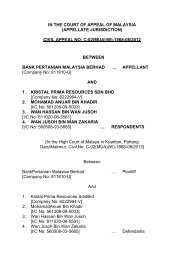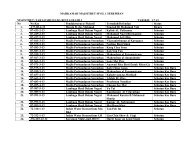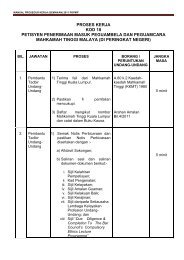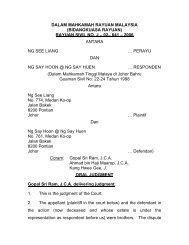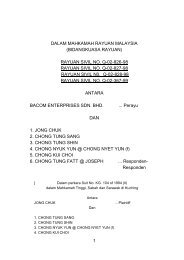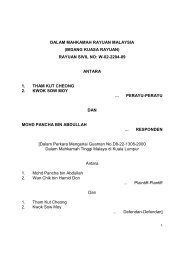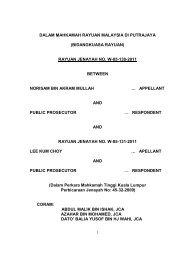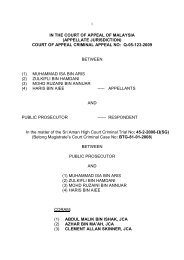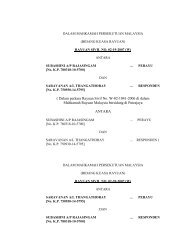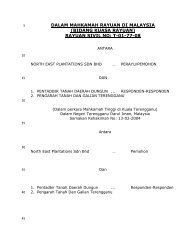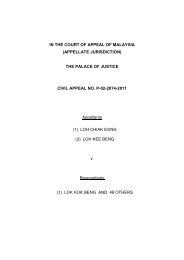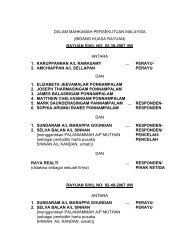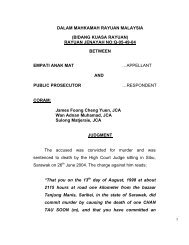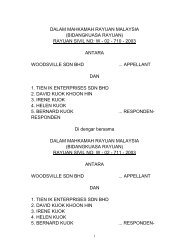in the court of appeal malaysia (appellate jurisdiction)
in the court of appeal malaysia (appellate jurisdiction)
in the court of appeal malaysia (appellate jurisdiction)
Create successful ePaper yourself
Turn your PDF publications into a flip-book with our unique Google optimized e-Paper software.
CONCLUSION<br />
As stated <strong>in</strong> <strong>the</strong> case <strong>of</strong> Dato’ Toh Kian Chuan v. Swee Construction<br />
and Transport Company (Malaya) Sdn Bhd (supra):<br />
1. For <strong>the</strong> petitioner to succeed <strong>in</strong> his application for <strong>the</strong><br />
said reliefs, he must show that it was <strong>the</strong> affairs <strong>of</strong> <strong>the</strong><br />
Company which were be<strong>in</strong>g conducted <strong>in</strong> an oppressive<br />
manner, and that <strong>the</strong> respondent company had oppressed<br />
<strong>the</strong> m<strong>in</strong>ority shareholders which <strong>in</strong> this case is <strong>the</strong><br />
petitioner.<br />
2. On <strong>the</strong> whole, <strong>the</strong> circumstances and matters compla<strong>in</strong>ed<br />
<strong>of</strong> by <strong>the</strong> petitioner did not at all denote that <strong>the</strong>re was<br />
oppression with<strong>in</strong> <strong>the</strong> mean<strong>in</strong>g <strong>of</strong> s 181(1) <strong>of</strong> <strong>the</strong> Act.<br />
There was noth<strong>in</strong>g to show that <strong>the</strong> 2 nd and 3 rd<br />
respondents’ action compla<strong>in</strong>ed <strong>of</strong> was designed to <strong>in</strong>jure<br />
<strong>the</strong> petitioner <strong>in</strong> its rights as a member. The petitioner<br />
had failed to prove that <strong>the</strong> directors represent<strong>in</strong>g <strong>the</strong><br />
respondents had acted <strong>in</strong> disregard <strong>of</strong> <strong>the</strong> petitioner’s<br />
<strong>in</strong>terest. There was noth<strong>in</strong>g to suggest that <strong>the</strong> company<br />
was not be<strong>in</strong>g conducted efficiently by <strong>the</strong> exist<strong>in</strong>g board<br />
<strong>of</strong> directors <strong>in</strong> <strong>the</strong> <strong>in</strong>terests <strong>of</strong> <strong>the</strong> members, nei<strong>the</strong>r was<br />
<strong>the</strong>re any violation <strong>of</strong> <strong>the</strong> conditions <strong>of</strong> fair play or any<br />
abuse <strong>of</strong> power be<strong>in</strong>g committed by <strong>the</strong> directors <strong>of</strong> <strong>the</strong><br />
respondents which could amount to oppression.<br />
Oppression must be <strong>in</strong> <strong>the</strong> form <strong>of</strong> dishonesty and <strong>in</strong> <strong>the</strong><br />
<strong>in</strong>stant case, <strong>the</strong>re was none.<br />
Hav<strong>in</strong>g gone through <strong>the</strong> evidence made available <strong>in</strong> <strong>the</strong> Record, we<br />
are <strong>of</strong> <strong>the</strong> view that <strong>the</strong> acts <strong>of</strong> <strong>the</strong> 2 nd and 3 rd respondents as stated by <strong>the</strong><br />
learned trial judge were not sufficient to prove that <strong>the</strong> petitioner, be<strong>in</strong>g a<br />
m<strong>in</strong>ority shareholder, had been oppressed. There is also no evidence to<br />
show that <strong>the</strong> directors represent<strong>in</strong>g <strong>the</strong> 2 nd respondent <strong>in</strong> <strong>the</strong> 1 st respondent<br />
87



